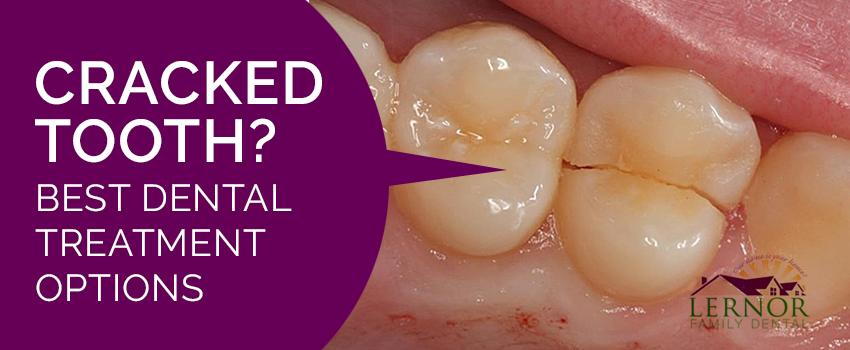
Cracked or fractured teeth can cause both you and your dentist a lot of headache to deal with. They can be very challenging to treat, because they often have unpredictable results. Once properly diagnosed and restored, your dentist will let you know how confident he feels in the longevity of the cracked tooth. What are the Symptoms of a Cracked Tooth? You may be experiencing pain with chewing from a tooth that shows no obvious signs of decay or breakage. This subtle symptom can make it difficult for some people to properly diagnose the problem. In many instances when biting causes sensitivity and there is no sign of anything else occurring, the diagnosis will be a cracked tooth. Another symptom of a fractured tooth is sensitivity with hot and cold, or sweets. When liquids, or the sugar from sweet drinks leak into the cracks, some discomfort is experienced for a slight instance. Diagnosis of Dental Cracks Small cracks are nearly impossible to detect in a radiograph, and they are rarely seen with the naked eye. A dentist may use a magnifier that allows them to see better, which can be extremely helpful in finding hard to see cracks. If we suspect that you are suffering from a fractured tooth, we may use special glasses or a high-resolution camera to see if the crack is visible. If both you and your dentist are having trouble identifying which tooth is causing your discomfort, then a bite stick may be used. This wooden or plastic tool has a raised side that you bite up and down on, trying to replicate the pain that you feel when you chew so that the fracture can be pinpointed. If this is unsuccessful at locating the problem tooth, a dental dye may be the next step. This is a liquid that is brushed onto your teeth. Once removed, if there is a crack, dye will have seeped into it (thus revealing itself.) What Are the Most Common Causes of a Cracked Tooth? Usually…
- Blunt force trauma, like being hit in the face or an athletic injury
- Having a strong bite force
- Jaw and tooth misalignment
- Biting on something hard, like a piece of candy or ice
- Grinding and clenching your teeth, during the day or night
Treatment Options for Cracked Teeth Treatment options rely heavily on the severity of the crack. It can be anywhere from a hairline fracture that is very shallow, to a severely deep crack that extends into the root of the tooth. Cracks can run horizontally or vertically. Once the fracture has been identified, our dentist will need to determine the extent of it in order to recommend appropriate treatment. Hairline Fractures or Craze Lines: Some cracks are superficial, affecting only the enamel, or outer surface of the tooth. These craze lines are very common and can become more frequent as we age. In many cases they require no treatment at all. You and your dentist will monitor the area and be ready to take action if the cracks begin to worsen. You may not like the appearance of craze lines, especially if they are on a tooth that shows when you smile. If you would like something done about it, then speak with your dentist. In most cases this can be fixed by simply removing that section of tooth and bonding a veneer or filling material in its place. Moderate Cracks: A moderate crack passes through the outer enamel and into the inner dentin layer of the tooth. Chewing up and down causes the cracked tooth to flex, which is what causes pain and discomfort. A tooth suffering from a moderate crack can benefit from a crown, or “cap.” Once the problem tooth is covered, it will no longer expand and contract, because it will be protected with this strong, fixed, restoration. Chewing will be done directly on the crown rather than the compromised tooth. In some cases, an entire section of the tooth (like a cusp) can crack and break away. This is commonly seen when someone bites into something very hard. Premolars (the teeth just in front of the molars and behind your “eye teeth”) are the most common ones to suffer from a broken cusp. This can be so painful that you can’t even close your teeth together without experiencing a jolt of pain. If the break doesn’t affect the root of the tooth, then a dentist can extract this section and protect the remaining tooth with a crown. Crown lengthening may be needed in order to ensure enough tooth structure for the cap to adhere to. This is an extra step in the crown process where our Scottsdale dentist will use and special machine to reshape some of the gum tissue around the base of the tooth. Deep Cracks: If it is a deep crack that goes past the body of the tooth and into the root, then the only option is permanently extracting it because unfortunately, there is no fixing this issue. Replacement options may include a dental implant, fixed prosthetic bridge, or a removable partial denture. Ultimately it is up to you, the patient, if you choose whether or not to replace the missing tooth. Our dentist will discuss your options with you and give a professional recommendation well before your tooth is removed. Depending on the size and location of the deep crack, repairing the tooth may be deemed a viable solution. We may recommend a root canal as a treatment option in certain cases. This will remove the nerve tissue within it, alleviating the pain and preventing you from having to get the tooth pulled. You may even be referred to an endodontist who specializes in root canals and can more effectively treat a cracked tooth. Endodontists may use microscopes and other state of the art equipment that aid in proper diagnosis and treatment that wouldn’t traditionally be available in a general practice setting. The endodontist will work together with our dentist to ensure you are provided with the best care possible. Toothache? Call for Emergency Dentistry in Scottsdale Looking for an emergency dentist in Scottsdale? If you are having symptoms of a cracked tooth, then give Lernor Family Dental a call so that we can address the issue promptly!
________________________
Do you suspect that you have a cracked tooth? Don't delay - contact Dr. Lernor, the best emergency dentist in Scottsdale, to get it taken care of quickly! Call (602) 483-4112 today.
